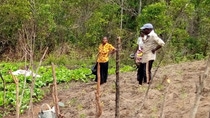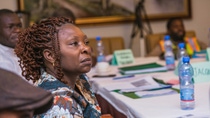Sustainability
Cross-industry partnership to enhance sustainable cobalt mining
The project “Cobalt for Development” aims at sustainably improving artisanal mining working conditions as well as living conditions for surrounding communities in Congo.
In cooperation with the local mining cooperatives, government authorities and civil society organizations, the project “Cobalt for Development" intends to strengthen legal compliance, improve health and safety conditions, environmental management as well as economic and social well-being.
In January 2019, the companies BASF, BMW, Samsung Electronics and Samsung SDI commissioned the Deutsche Gesellschaft für Internationale Zusammenarbeit (GIZ) GmbH to implement this fully privately financed cross-industry initiative. In 2020, Volkswagen joined the project. None of the commissioning parties operate project mines.
Together with our partners, we are committed to sustainable cobalt mining. In this joint project in Congo, we want to understand how the living and working conditions of local people can be improved. We will bring in the project findings into, for example, the Global Battery Alliance, of which we are a founding member.”
This fully privately financed project seeks to pilot an approach to address challenges in artisanal mining. As it is limited to pilot mines and surrounding communities, it seeks to contribute to identifying workable solutions that lead to better working conditions at the mine site. If proven effective, these measures could then be scaled up to other legal artisanal mine sites and enhance systemic challenges in the longer run.
The pilot project will focus on analyzing occupational and environmental risks to develop and implement responsible mining practices. Local partners such as the artisanal mining cooperatives will participate from the beginning in developing and implementing these measures to strengthen local ownership and sustainability of the approach. In the nearby communities, the focus will be to improve access to education, as well as financial literacy and alternative incomes for its residents.
The progress of “Cobalt for Development” is regularly evaluated to continuously improve the project approach. These lessons learnt could then form the basis if project measures are extended to other mine sites.
BASF is committed to a responsible and sustainable global supply chain for cobalt. Although BASF does not procure cobalt from artisanal mines, we actively support “Cobalt for Development” as it aims to look for new ways to improve the sustainability of the supply chain.”
Cobalt is a key component in the production of batteries for the automotive and electronics industries. The world’s largest known reserves of this raw material are found in the Democratic Republic of the Congo. Industrial mining accounts for approximately 80-85% of Congolese cobalt production, with artisanal mining operations producing the remaining 15-20%. Currently, companies are facing challenges in the areas of environment, health and safety, and human rights when cobalt is extracted through artisanal mining.
This is the first time partners from various industries, such as the automotive, chemical and consumer electronics industries, have come together in a project on the ground to address the challenges of artisanal cobalt mining in the Democratic Republic of the Congo. This pilot project builds on a feasibility study jointly conducted by GIZ and BMW Group. Insights gained from visits to several artisanal mines, stakeholder interviews and surveys of miners and community members were instrumental in shaping this project approach. This project also contributes to the goals of global initiatives, such as the Global Battery Alliance (GBA), to foster sustainable supply chains.


